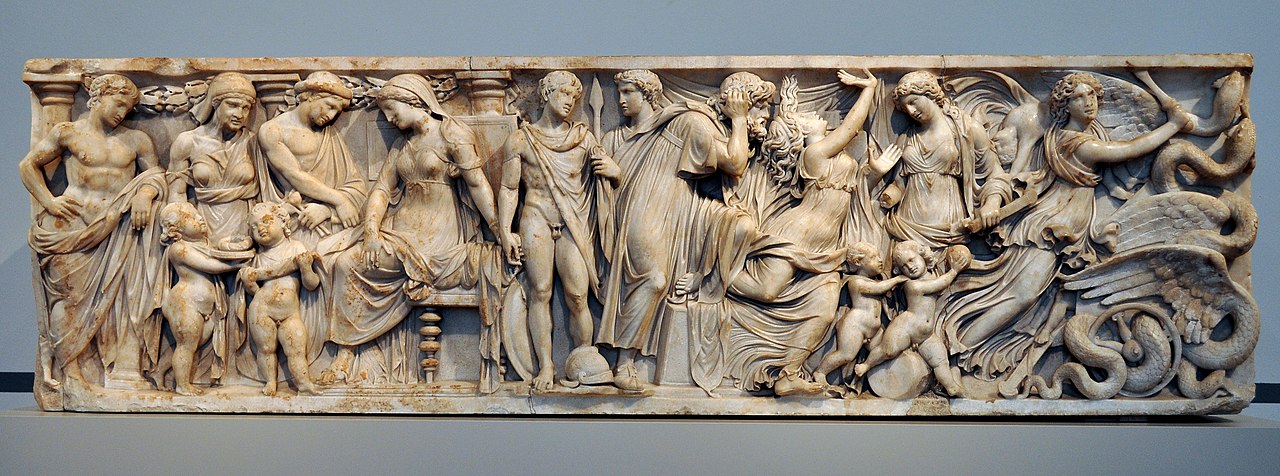

As part of the Higher classical studies exam, you must write an essay on one of five themes, referring to at least one piece of classical literature in your answer. There are many different types of Greek literature, including the epic poem and the Greek play. We will focus on three of the most famous Greek plays: Medea, Oedipus Rex and Antigone. The following is background information on Greek plays. While it isn’t necessary to memorise this information, it should improve your overall understanding of the plays you will study and provide insight into the Classical Greek world of literature.
Greek plays were usually either comedies or tragedies. Both types had a format they often followed: comedies usually revolved around a person of no status and low birth, who makes up for their lack of power with more than enough cunning and bravado. The play focuses on the resolution by the protagonist of one or more problems, and has a happy ending for the main character. Tragedies, on the other hand, were usually completely opposite: the main character was noble and often closely related to royalty and/or the gods. However, they had a fatal flaw that caused problems for themselves and the people around them, and eventually led to their tragic downfall at the end of the play.
All the plays we will focus on are tragedies. The three great Greek tragedians include Aeschylus, Sophocles and Euripides; Euripides wrote Medea, while Sophocles is the author of Oedipus Rex and Antigone.
Greek plays were performed in real time: there were no flashbacks or time skips. They usually lasted for about two hours, and so the plot described only two hours of the lives of the characters. However, characters often mentioned events that had occured days, months or years before the beginning of the play. For example, during the play Antigone, Antigone discusses the circumstances regarding the death of her brothers, which had happened the day before.
A key part of every Greek play was a chorus, a group of men who sang and danced. They represented a specific group of people within the play, and who they were depended on which play they were in. For example, in Medea the chorus was a group of Corinthian women, and in Oedipus Rex and Antigone they played a group of respected Theban elders. One of the chorus’ main purposes was to be the play’s narrator: they foreshadowed tragic outcomes, explained what was going on and discussed the thoughts and feelings of the main characters. They also provided their own view on the actions that occured, so they often served as the voice of reason in opposition with the immoral acts of the main characters. For example, the Chorus in Medea, while sympathetic to Medea because she was abandoned by her husband, desperately try to persuade her not to kill her own children. The Chorus usually said what the audience (and the author) were thinking or feeling. In direct contrast to the main characters, who constantly made vital decisions, the Chorus were usually nothing more than passive observers. However, in some plays they had a real impact on how the plot progressed. For example, in Oedipus Rex the Chorus convince Oedipus not to kill or banish his uncle and brother-in-law Creon, and therefore have a significant impact on the outcome of the play.
The chorus spoke with other characters in the main acts of the play, however they also had their own choral songs called stasimons. During a stasimon the chorus were usually the only speakers on stage, and would sing and dance. A stasimon could comment on things that had just happened in the play, the emotions and motivations of the characters, or whether a character’s actions were right or wrong. The chorus would also often praise the gods and/or give broad and philisophical insights into human nature that usually represented the views of the author.
Ancient Greek playwrights had to contend with a number of limitations. Apart from the chorus there were usually only three actors in any given play, all of them male, who had to act out all of the different characters between them. This meant there were only ever three characters on stage at any particular time, and actors would wear a different mask to show which character they were.
The Ancient Greeks had little knowledge about special effects and costume makeup so many events had to occur offscreen. This usually included deaths and some other events, such as Oedipus gouging his own eyes out at the end of Oedipus Rex. Instead of seeing the event itself, the audience was usually notified of it by another of the characters, usually a messenger or servant, who would go into often quite gory detail.